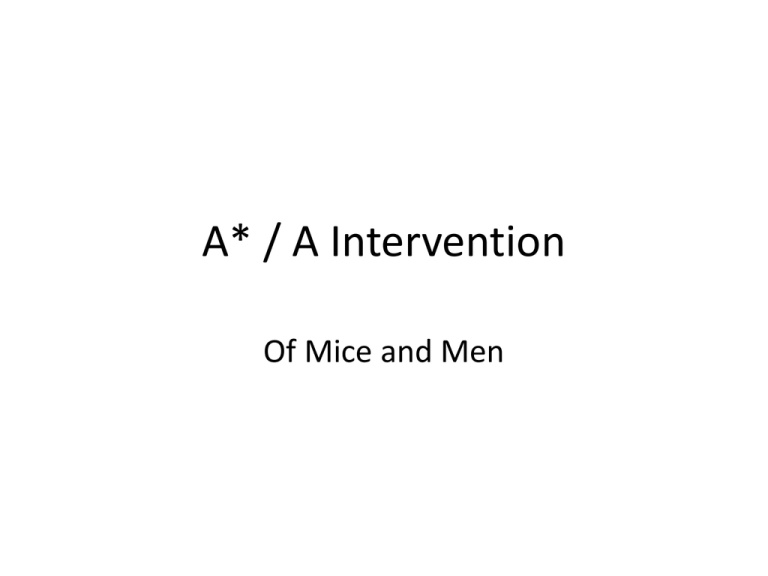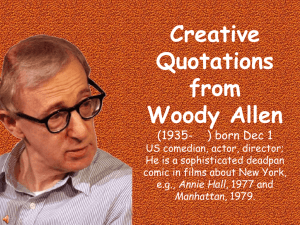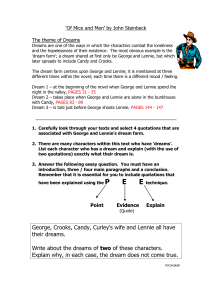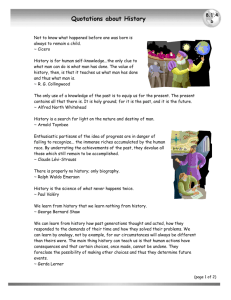here.
advertisement

A* / A Intervention Of Mice and Men What you should have done so far • Written down at least ten points relating to the American Dream on a mind map. • Highlighted five points that you will use in your CA. Quotation Gathering • Find at least one quotation for each of your points. Annotate each of the quotations you find with: Overall analysis Analysis at word level (connotations) Structure of the quotation / chapter if relevant Quotations • There is a path through the willows and among the sycamores, a path beaten hard by boys coming down from the ranches to swim in the deep pool, and beaten hard by tramps who come wearily down from the highway in the evening to jungle-up near water. (1.2) Analysis: Something about this sentence makes us think that Steinbeck is suggesting that those carefree boys coming down for a swim—probably full of their own American Dreams—are going to grow up to be those tired, glum tramps. Quotations • "Guys like us, that work on ranches, are the loneliest guys in the world. They got no family. They don't belong no place. They come to a ranch an' work up a stake and then they go inta town and blow their stake, and the first thing you know they're poundin' their tail on some other ranch. They ain't got nothing to look ahead to." (1.113) Analysis • Whatever the American Dream is, this isn't it: a bunch of lonely, itinerant farmworkers that George describes as being without family or hope. Steinbeck seems to be saying that you can't build a nation on these men—and we're inclined to agree. Quotations • "For two bits I'd shove out of here. If we can get jus' a few dollars in the poke we'll shove off and go up the American River and pan gold. We can make maybe a couple of dollars a day there, and we might hit a pocket." (2.166) Analysis • What George fantasizes about here is a typical American Dream: heading out West to pan for gold, and striking it rich. Too bad that's only ever happened to maybe a handful of people in the entire country. The people who really got rich from the gold rush were the shopkeepers: it's not as romantic, but everyone needs to buy shovels and boots. Quotations • …he moved with a majesty only achieved by royalty and master craftsman. He was a jerkline skinner, the prince of the ranch, capable of driving ten, sixteen, even twenty mules with a single line to the leaders. He was capable of killing a fly on the wheeler's butt with a bull whip without touching the mule. There was a gravity in his manner and a quiet so profound that all talk stopped when he spoke, His authority was so great that his word was taken on any subject, be it politics or love. This was Slim, the jerkline skinner. (2.170) Analysis • Slim represents what others aspire to. He could therefore represent other ranch workers’ American Dreams. Quotations • "…If I was bright, if I was even a little bit smart, I'd have my own little place, an' I'd be bringin' in my own crops, 'stead of doin' all the work and not getting what comes up outa the ground." (3.11) Analysis • George seems to think that he could achieve the elusive American Dream of having his "own little place" if he were just a little smarter. But from what we see, it has nothing to with smarts and everything to do with the odds being stacked against him. If everyone could achieve the American Dream, would it still be a dream? Quotations • Lennie watched him with wide eyes, and old Candy watched him too. Lennie said softly, "We could live offa the fatta the lan'." • "Sure," said George. "All kin's a vegetables in the garden, and if we want a little whisky we can sell a few eggs or something, or some milk. We'd jus' live there. We'd belong there. There wouldn't be no more runnin' round the country and gettin' fed by a Jap cook. No, sir, we'd have our own place where we belonged and not sleep in no bunk house." (3.202-203) Analysis • George and Lennie's little version of the American Dream includes a kind of masculine domesticity—no girls allowed. Quotations • "You’re nuts." Crooks was scornful. "I seen hunderds of men come by on the road an’ on the ranches, with their bindles on their back an’ that same damn thing in their heads. Hunderds of them. They come, an’ they quit an’ go on; an’ every damn one of ‘em’s got a little piece of land in his head/ An’ never a God damn one of ‘em ever gets it. Just like heaven. Ever’body wants a little piece of lan’. I read plenty of books out here. Nobody never gets to heaven, and nobody gets no land. It’s just in their head. They’re all the time talkin’ about it, but it’s jus’ in their head." (4.64) Analysis • Crooks seems to be realistic about others’ American Dreams. Quotations • Candy said, "That bitch didn't ought to of said that to you." • "It wasn't nothing," Crooks said dully. "You guys comin' in an' settin' made me forget. What she says is true." (4.136-137) Analysis • Turns out, there's a little spark left in Crooks, too. He has a vision of America where he can retain a little dignity working for Candy, Lennie, and George—but Curley's wife is happy to step all over his little American Dream, even though hers is just as unattainable. Quotations • "I tell you I ain't used to livin' like this. I coulda made somethin' of myself." She said darkly, "Maybe I will yet." And then her words tumbled out in a passion of communication, as though she hurried before her listener could be taken away. "I lived right in Salinas," she said. "Come there when I was a kid. Well, a show come through, an' I met one of the actors. He says I could go with that show. But my ol' lady wouldn' let me. She says because I was on'y fifteen. But the guy says I coulda. If I'd went, I wouldn't be livin' like this, you bet." (5.34) Analysis • Making it big in Hollywood may have been a fairly new American Dream in the 1930s, but it was definitely around. Just the special effects weren't quite as awesome. Quotations • "Then—it’s all off?" Candy asked sulkily. George didn’t answer his question. George said, "I’ll work my month an’ I’ll take my fifty bucks an’ I’ll stay all night in some lousy cat house. Or I’ll set in some poolroom til ever’body goes home. An’ then I’ll come back an’ work another month an’ I’ll have fifty bucks more." (5.79-80) Analysis • At the end of the novel, George isn't any closer to his little slice of the American pie. In fact, he's farther away than ever, looking forward to a life of cat houses and pool rooms. That may be a fourteen-year-old boy's American Dream, but it's no life for a grown man. Unfortunately, it's the only life he knows. PEA practice • Let’s write an A grade PEA paragraph together… Read through the sample essay • What are the positives? • What areas need improving?




